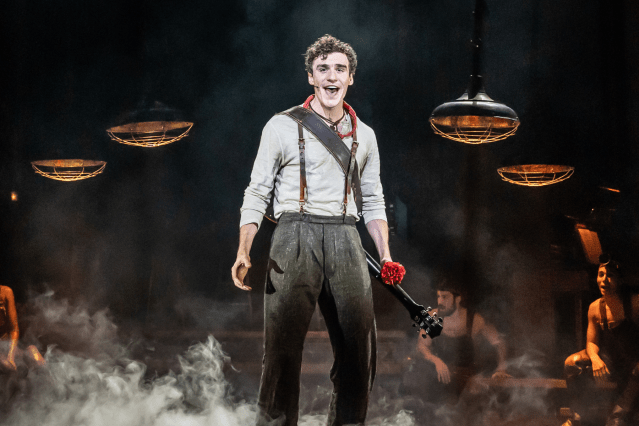After its multi award-winning hit last year with Saint Joan, the National Theatre has this week served up another George Bernard Shaw classic, 1905’s Major Barbara. Artistic director Nicholas Hytner’s revival opened in rep on Monday (4 March 2008, previews from 26 February), the first production in the sixth annual Travelex £10 Season in the NT Olivier (See News, 14 Nov 2007).
Major Barbara works tirelessly for the poor at a Salvation Army shelter until a large but morally dubious donation is welcomed from her estranged father, Andrew Undershaft, a millionaire weapons manufacturer. But when she visits the factory itself, the well-fed workers in their thriving model town make a devastating case for arms trade profits and a whole new set of ideals.
The NT production stars Simon Russell Beale as Andrew Undershaft and Hayley Atwell as Major Barbara, along with Paul Ready as Adolphus Cusins, Barbara’s Greek scholar fiancé, and Clare Higgins as her mother Lady Britomart Undershaft. The cast also features John Heffernan, Tom Andrews, Stephanie Jacob, Paul Anderson, Ian Burfield and Patrick Drury. The production is designed by Tom Pye.
First night critics were impressed by Hytner’s “elegant” and “stately” production and particularly by the performance at its centre from Simon Russell Beale who, while cast against type as the Barbara’s estranged arms manufacturer father, is nevertheless on “superb” and “commanding” form. There was also praise for the work of Paul Ready, Clare Higgins and John Heffernan in particular, though critics were less effusive about Hayley Atwell. While some acknowledged that the actress is “glowing” and “spirited”, many found her title performance “underpowered”, making the ideological battle between her and Russell Beale uneven. Ultimately, there was also uncertainty about the robustness of Shaw’s dramatic arguments and the playwright’s capacity to fully understand “man’s capacity for evil”.
Michael Coveney on Whatsonstage.com (three stars) – “The flaw in Nicholas Hytner’s otherwise stately, jaggedly articulated and beautifully weighted production is that Hayley Atwell as Barbara doesn’t have the right acting chops for the role. She flutters prettily enough, but she’s never secure in gesture, demeanour or vocal expression. This unbalances the contest with her father, supremely well played by Simon Russell Beale as a gravely pragmatic monster with a coarsened streak and a subdued, pause-pocked rhetorical style that allows his formative decision – never to starve, at any price – to hit home gloriously in the last act … The second act is a masterpiece of stagecraft, and Shaw’s victims of circumstance – Ian Burfield’s savage Bill Walker, Stephanie Jacob’s Dickensian Rummy Mitchens and Patrick Drury’s sour old Peter Shirley – are as engaging in their way as the Undershaft clan, supervised by Clare Higgins’ wonderfully imperious and blinkered Lady Britomart … The play remains an unalloyed pleasure on the ear, its irreverent and subversive manner of argument – only an Irishman could have written it – a joy forever. Paul Ready is an excellent Adolphus, supple and spring-heeled in thought, while the moon-faced, gently swaying John Heffernan is a perfect Stephen Undershaft … his scene with his father is a high point in the evening’s comedy playing.”
Michael Billington in the Guardian (four stars) – “I am delighted that Nicholas Hytner has overcome his aversion to Shaw. But I am even more thrilled to discover that, while paying homage to the dialectical vigour and emotional power of this 1905 piece, he has also subjected it to his critical gaze … Even if we don’t buy Shaw’s final thesis, that is no reason to ignore his play, and Hytner makes an overwhelmingly strong case for it. Simon Russell Beale, refreshingly cast against type as the iron-willed Undershaft, invests him with a pause-filled gravitas and deeply moving paternal passion: gazing at Barbara with unconcealed admiration, yet barely able to touch her, Russell Beale wondrously proves that anyone who thinks Shaw emotionless must be deaf and blind. Although vocally a touch under-powered, Hayley Atwell captures Barbara’s shining, bright-eyed faith and there is a superb performance from Paul Ready as Cusins: confronting Undershaft eyeball to eyeball, he almost makes you believe that an academic could take on the industrial-military complex. John Heffernan as Undershaft’s priggish son and Clare Higgins as his patrician wife also do fine work in a production that, while doing full justice to Shaw, sanely views him from a sceptical 21st-century perspective.”
Nicholas de Jongh in the Evening Standard (four stars) – “What a shock it is to realise that this great, ironic comedy by Bernard Shaw speaks to us with even more chilling urgency than it did at its 1905 premiere. For Major Barbara sketches a portrait of Britain in which Simon Russell Beale’s devilishly persuasive manufacturer of war weapons, Andrew Undershaft, revels in the fact that his power is unassailable, that he stands high above the control of governments … A thrilling war of ideas is launched. It involves Andrew’s estranged daughter, Hayley Atwell’s oddly subdued Major Barbara herself, a Salvation Army girl trying to do good, together with the man she loves, Adolphus Cusins whom Paul Ready does not make intellectually vivacious enough. They are up against Undershaft, to whom imposing Russell Beale lends the remains of an East End accent and an impassioned certainty that ill-gotten gains from selling weaponry can be used for a good cause … Nicholas Hytner’s elegantly nuanced production conveys Shaw’s jovial, comic cynicism, particularly in a perfect scene where Undershaft discovers his useless son is only fit for politics or journalism. Better still it captures the savage, Shavian irony of Cusins’ duel of words with Undershaft …Major Barbara remains a timeless play for today.”
Benedict Nightingale in The Times (three stars) – “Shaw’s Major Barbara is at root a pernicious play … But it’s packed with wit, dramatic colour and articulate energy. It also has some terrific parts for actors, prime among them the armaments tycoon Andrew Undershaft, played in Nicholas Hytner’s fine revival by Simon Russell Beale. Yet again this marvellous actor displays his range, transforming himself into a cool, watchful, quietly formidable character who effortlessly exudes authority and betrays his humble origins and inner strength mainly through a style of diction that combines bluntness with a growl in the throat. When Undershaft boasts of being ‘a manufacturer of mutilation and murder’, it’s as if he’s been gargling with cordite. At the play’s core is a wager between him and his long-estranged daughter, the Salvationist Barbara … But it’s an uneven contest … Hayley Atwell’s Barbara is warm and spirited but doesn’t have enough weight or intensity … Clare Higgins is hilariously majestic as Barbara’s bullying mother and Paul Ready her mild-seeming, yet oddly tough, fiancé. John Heffernan … is excellent as her wan, prim, ultra-conventional brother. And, of course, the great Beale: sophisticated yet somehow rough, given to long wary pauses – and more dangerous than that brilliant fool, Shaw, quite realised.”
Paul Taylor in the Independent (four stars) – “Shaw has been well and truly whipped off the shelf at the National Theatre where a successful production of Saint Joan last summer is now followed by Nicholas Hytner’s incisive revival of Major Barbara … But though Hytner has evidently managed to conquer his distaste for Shaw, it’s a relief to report that he hasn’t undergone a wholesale conversion. His production revels in the play’s argumentative energy and it does a most persuasive job in drawing out the emotional subtext of the debate, but it is also admirable for the honest scepticism with which it acknowledges the dangerous implications of Shaw’s ideas. Simon Russell Beale invests this self-made diabolical provocateur with a quiet, watchful, authority and a gravelly accent that betrays his East End origins … You also see here his frustrated paternal yearning for Barbara, played with a glowing fervour by Hayley Atwell. He can’t take his admiring eyes off her, but is too inhibited by the years of estrangement to make the physical contact for which he longs. Hytner valuably reinforces a sense of unresolved family issues complicating their intellectual quarrel. The production negotiates with verve the Wildean drawing-room comedy of the first act (with Clare Higgins in hilarious form as the formidable, upper-crust mother and John Heffernan deliciously priggish as the conventional son) and the Dickensian humour of the second. In the difficult role of the professor of Greek, Paul Ready skilfully suggests the tension between moral revulsion of Undershaft and intellectual enjoyment of his outrageousness.”
Charles Spencer in the Daily Telegraph – “Nicholas Hytner continues the National Theatre’s rediscovery of Shavian pleasures with Major Barbara … This is a drama that asks big questions: is there such a thing as a just war, and can bullets and bombs ever be the way to peace and security? … Hytner’s assured production stylishly captures the play’s entertaining mixture of social comedy and paradoxical, witty debate … Simon Russell Beale is in commanding form as Undershaft, delivering Shavian paradoxes with effortless panache … But this superb actor also suggests an emotional neediness deep inside the arms dealer that I don’t think even Shaw quite envisaged. There is superb work too from Hayley Atwell, who positively glows with spiritual fervour in the title role, from Clare Higgins as her Lady Bracknell-like mother, from John Heffernan as her hilariously pompous brother and Paul Ready as a besotted Greek professor turned idealistic arms manufacturer. Yet I left the theatre feeling dissatisfied. Major Barbara is full of zest, but lacks the flesh and blood of great drama. As so often with Shaw, who was later to become an admirer of Stalin, you feel that here was a dramatist who never fully understood man’s capacity for evil. Shaw’s witty chatter about the armaments industry was to be followed, a decade after the play’s premiere, by the bloody, muddy horrors of the Somme, a catastrophe entirely beyond Shaw’s emotional range or dramatic imagination.”
– by Terri Paddock












